Intersex Day of Solidarity: What it’s like to grow up intersex
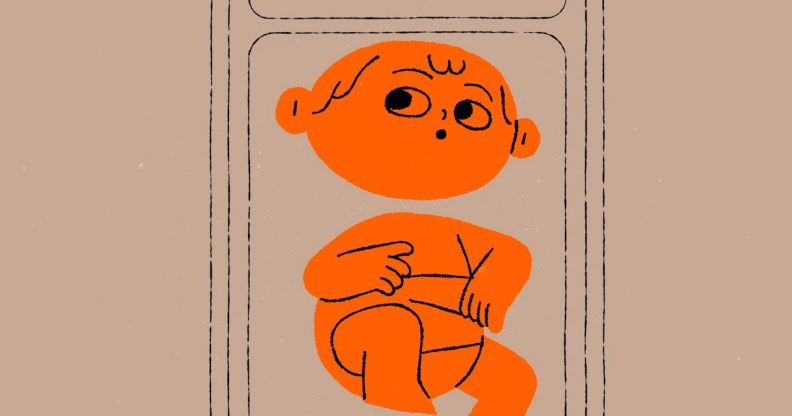
This animation shows what it is like growing up intersex (Antimatter.tv)
November 8 is Intersex Day of Solidarity 2018, so PinkNews spoke to three intersex activists to find out what it’s like to grow up intersex because as intersex activist Anick points out, the “I in LGBTI+ does not stand for invisible, it stands for intersex.”
What does intersex mean?
Even though it has been predicted that there are as many intersex people in the world as redheads, it is not a term that is widely understood. PinkNews recently spoke to activists in the documentary Sidney & Friends to find out what it’s like to be intersex in Kenya.
Intersex means that you are born with sex characteristics and hormone receptor responses (this include genitals, gonads and chromosome patterns) that do not fit typical binary notions of male or female bodies. It is an umbrella term used to describe a wide range of natural bodily variations. In some cases, intersex traits are visible from birth while in others, they are not apparent until puberty. Some traits may not be visible at all.
What is it like to grow up intersex? https://t.co/8Tm4Qi1AAn #IntersexDayofSolidarity pic.twitter.com/WmnTAJS9fF
— PinkNews (@PinkNews) November 8, 2018
Being intersex is distinct to sexual orientation and gender identity. It relates to biological sex characteristics only, meaning an intersex person may identify in a number of ways, such as genderfluid, transgender, straight, gay, bisexual, lesbian, or asexual.
What is Intersex Day of Solidarity?
Intersex Day of Solidarity 2018 is on November 8. It is a day to celebrate activists, advocate for human rights—and the perfect opportunity to up your game as an ally.
Kimberly Zieselman, executive director of interACT, told PinkNews: “For me, Intersex Day of Solidarity is a time to recognise those in the intersex community who have blazed the trail before me and others currently on the front lines of intersex activism. These include folks like Sally Gross from South Africa who have already passed away.
“It’s a day to be proud of being intersex and be grateful for each other.”
What is it like to grow up intersex?
In I am intersex, an animation produced by Antimatter.tv, Pidgeon Pagonis voices a fellow intersex person’s experience of growing up with pressure from doctors to have “normalisation surgery.”
Watch the video above to hear their story.
Holly Greenberry, a intersex/VSC-bodied, pansexual woman who co-founded intersexUK, told PinkNews it was, at times, “pretty brutal growing up” as a young person in the 1980s and ’90s, but is happy to now be a positive role model who has been to university, is now a parent to an 11-year-old daughter, and even trained as a free diver.
She told PinkNews that she had in the past “been called a faggot, a tranny, a dyke—every derogatory term relating to gender.”
Holly felt pressure to undergo surgery by a surgeon who, it turned out, had no experience of operating on an intersex/VSC-bodied person.
“During surgery they realised there were significant internal problems and it resulted in absolutely horrific damage,” she explained.
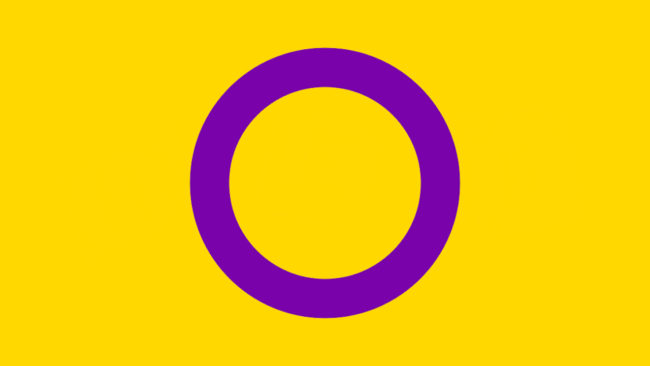
The intersex flag (PinkNews)
She later received “amazing care” from UCLH’s multi-disciplinary intersex team and has only grown stronger as a positive role model.
“I’m now a mother of an eleven-year-old daughter and she’s the best thing that ever happened to me. I’m very fortunate to work at intersexUK, where we’re engaging with parliamentary bodies and our reports are helping UN Treaty condemnations of surgeries and harmful practices on children in the UK,” she said.
How do you know if you’re intersex?
For Intersex Day of Solidarity, 23-year-old intersex activist Anick—the subject of a new BBC documentary—spoke to PinkNews about his experiences and the issues his community are facing.
He explained: “I found out I was different when I was very young, perhaps it was around the age of 5. I felt like I was some kind of alien because there would always be a huge interest in my body,” he said.
“I didn’t know what was different, but I knew it was something ‘down there’ in my private parts. Ironic, how they were called my ‘private’ parts by the very doctors and nurses who would encourage lots of other people to take a look.
“But it wasn’t until one of my doctors used the phrase ‘intersex’ instead of the medicalised terms that I saw beyond this idea that I was ‘wrong’ or ‘sick.’ Having that word introduced to me helped to usualise my experience, it helped me to understand that it’s not common but that doesn’t mean I’m alone.”
Kimberly Zieselman, executive director of interACT, discovered she was intersex as an adult.
“I grew up in the 1970s and ’80s but didn’t know I was intersex until much later when I retrieved my medical records as an adult,” she explained.
“The truth about my own body and the medical interventions done to me as a child were kept secret. That was more common back then and thankfully not the standard of practice any longer.
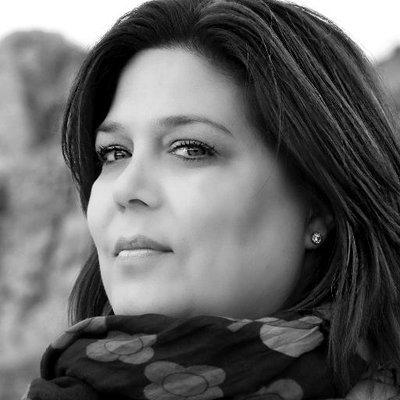
Kimberly Zieselman (Twitter/@XOXYKZ)
“However irreversible and medically unnecessary, interventions are still done on intersex babies and children without their consent causing great emotional and physical harm. And it has to stop.”
Holly Greenberry grew up in loving family in pre-internet days. “It was made apparent to my mum and dad a couple of days after I was born by a health worker,” she explained.
“The decision was made that I would be initially raised male. I was raised in a really loving family in Yorkshire and went through absolute hell.
“I never felt I identified the same as other girls and knew I was different—I understood there were some real problems from about four or five.”
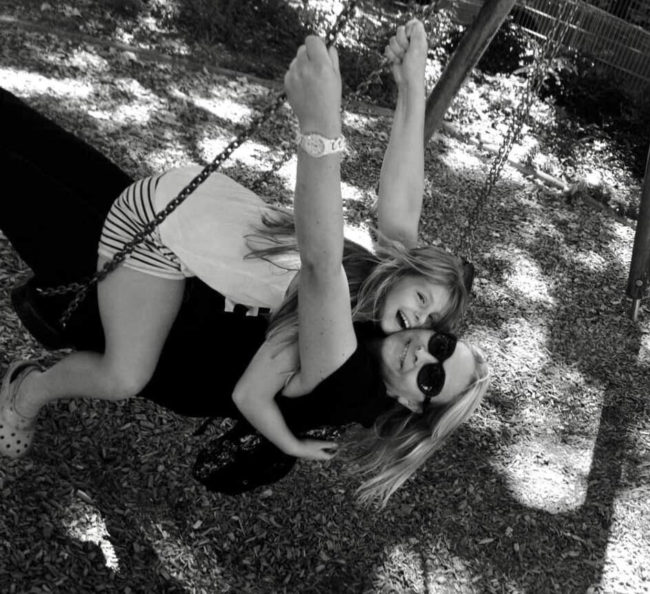
Holly, who is intersex and pansexual, with her daughter (Holly Greenberry)
She added how important it is that “we get to meet other people like us.” Through her work at intersexUK, Holly now provides support to other families as well as working with government bodies to tackle misunderstanding about intersex issues.
What can allies do to help?
Get to know intersex activists, learn about the Intersex Justice Project, make space for intersex voices, use intersex-inclusive language and educate others who may not be in the know.
Follow Anick, Kimberley Zieselman, US-based organisation interACT, and UK-based organisation intersexUK on social media and amplify their voices.
Anick added: “Be aware of the language that you use. Intersex is not a dirty word. Yes, some people prefer to use other terms, but best practice should involve finding out what we prefer to use ourselves.”
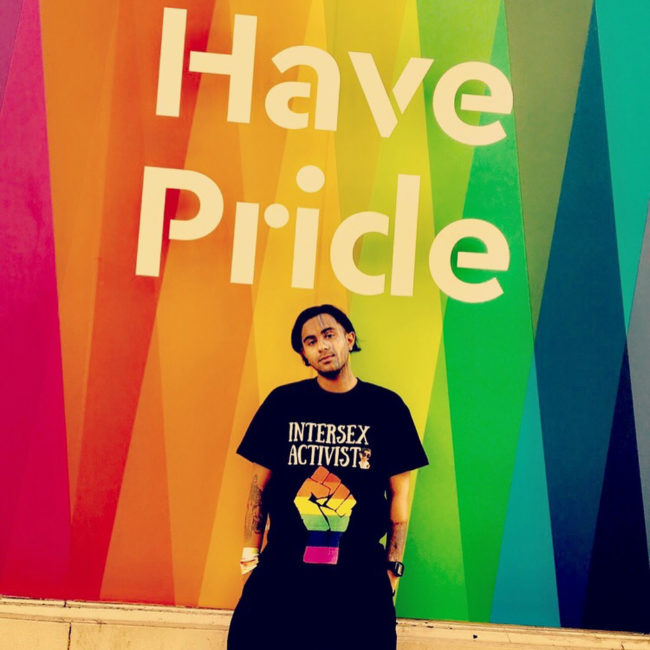
Anick marched for intersex visibility at Pride in London (Instagram/@anickians)
Holly Greenberry, who co-founded intersexUK, an organisation that works with government bodies to advocate for rights and families to provide support with “no significant funding at all.”
She told PinkNews: “It’s really important people engage and donate. It’s also really important allies make space.”
It’s important to recognise that intersex people understand themselves in many different ways and use a variety of different terms.
Some people, Greenberry explained, prefer the term VSC, meaning variation of sex characteristics.
She also emphasises the need for sex education to be intersex-inclusive and for medical staff to be more informed on intersex and VSC-bodied issues.
“It’s crazy that the same health services that prevent trans people from having hormone blockers is the same health service prescribing surgeries on intersex babies and children without their consent,” she added.
“We are still only at the tip of the iceberg. Kids are being talked about in front of them with curiosity, as if they are a subject matter, speaking in very intensely complex ways. Families have told us that one of the most damaging things is the way medical staff have spoken to them.”

